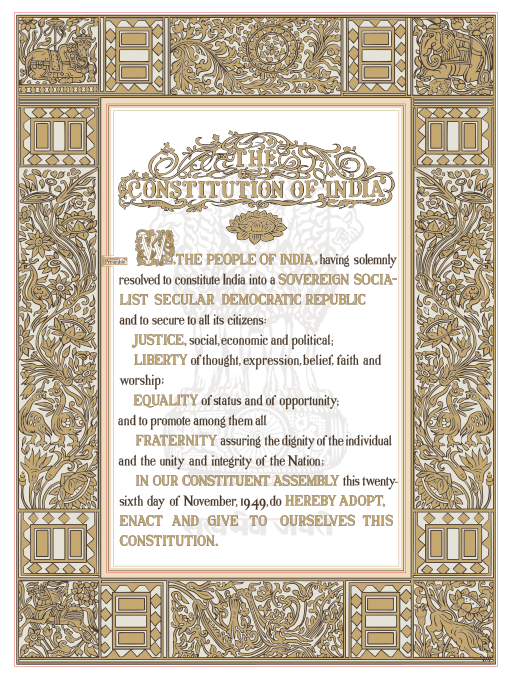Indian Polity / Making of the Constitution
Preamble of the Indian Constitution
Preamble is an introduction or a foreword to the Constitution which outlines the ideals and objectives for which the Constitution of India
was made. It contains the doctrine of the Constitution. The source to the Preamble of the Constitution was Objective Resolution of Jawaharlal Nehru, who
introduced it in the Constituent Assembly on 13th December, 1946. The secondary sources are the French Revolution, American War of Independence and the UN
Declaration (we, the people of United Nations). Preamble is not part of Constitution and is not justiciable.
Explanation of the Preamble
- "We, the people of India, having solemnly resolved to constitute India into a" - It implies that the ultimate political power lies with people of
India and they are source to the political power and it is prepared by them.

Source: Wikimedia
- "Sovereign Socialist Secular Democratic Republic" -
- Sovereign - It means a country is externally independent and internally supreme
- Socialist - It means establishing or achieving egalitarian society by providing equal opportunities and reducing disparity among the Rich and the
Poor through nationalization of all resources
- Secular - A secular country is a non-religious country, where there will not be any official religion, no discrimination and no special rights on
the basis of religion. Totally, there is freedom of religion
- Democratic - The real meaning of Democracy is rule of law
- Republic - Republic implies that the head of the country as well as other public representatives are elected periodically
- "and to secure to all its citizens JUSTICE, social, economic and political" -
- Social justice implies that no discrimination on the basis of race, religion, sex and caste
- Political justice means there should be equal opportunities to all the citizens to participate in the political affairs of the country
- Economic justice means providing equal opportunities in the matters of public employment, business, trade, commerce, occupation and contracts and
ensuring freedom from hunger
Significance of the Preamble
- Preamble provides legal help to the judges of Supreme Court and High Courts for proper interpretation of the Constitution. Preamble provides a
source for the date of adoption of the Constitution.
- Regarding the Preamble as part or non-part of the Constitution, Supreme Court maintained contradictory stand. Until 1960, Supreme Court was maintaining the
stand that the Preamble as part of the Constitution.
In 1960 Berubari Union case, Supreme Court ruled that Preamble is not a part of the Constitution.
But in 1973 Kesavananda Bharathi v/s Kerala case,
Supreme Court completely reversed the judgement and held that Preamble as part of the Constitution but not justiciable.
Extra Information
- Three expressions namely Socialist, Secular and Integrity were being inserted into the Preamble in 1976 by the 42nd Constitutional
Amendment. This is first and last amendment to the Preamble
- Comments on the Significance of the Preamble -
- Pandit Thakur Das Bhargava (Member of the Constituent Assembly) observed that Preamble is the most serene segment of the Constitution. It is the very
heart and soul of the Constitution. It is a key to the Constitution
- K.M. Munshi observed that Preamble is a political horoscope to the Constitution
- Nani Palkhiwala observed that Preamble is the Identity Card of the Constitution
- C.J. Dyer observed that Preamble is a key to open or to read the minds of the makers of the Constitution
Quiz
- Through which Amendment, the Preamble of the Indian Constitution was amended for the first time
- 15th Amendment
- 42nd Amendment
- 44th Amendment
- Not amended till now
Answer
Ans: B
- When was the Constitution of India adopted by the Constituent Assembly?
- 26th January 1950
- 15th August 1947
- 24th January 1950
- 26th November 1949
Answer
Ans: D



